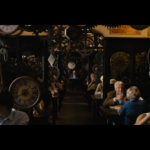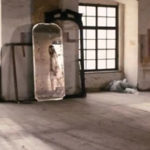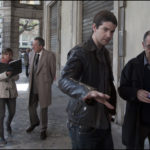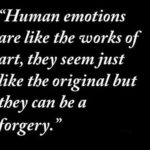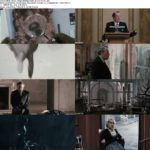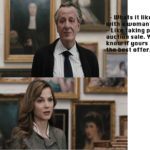“You think you’ve made it with a woman, that’s when you lose grip on strategy”
Deception in the art world is always a subject of no little fascination on file, but Giuseppe Tornatore‘s English language film with a splendid cast is truly a minor gem within the genre. You could call it a romantic drama with twists, but it is much more a beguiling mystery of truth, lies, trust and loneliness, and, indeed, obsession.
Critics considered it overlong, convoluted and formulaic, though to my mind it surpasses all cliches by virtue of sheer craft and quality. You can appreciate each component individually, though as a while they offer a bigger picture. It’s a film that needs light and space in which to flourish.
The principle protagonist, Geoffrey Rush‘s eminent auctioneer, Virgil Oldman, an untrusting bachelor with fraudulent sidelines who believes he has identified a profitable source of art and antiques in a severely agarophobic and reclusive young woman living in a run-down villa packed with collectibles.
The woman, Claire Ibbotson (Sylvia Hoeks), makes excuses for not meeting, but apparently trusts Oldman to value the contents of the villa. For all the wonderful items on display, he has his eyes on antique cogs which together, it later transpires, form an automaton and an elaborate plot.
However, the reality is that Oldman is enticed by the image with which he is presented. For the first time in his life, Virgil falls in love, the apparent loneliness binding he and Claire together. There is much more to this strange relationship than meets the eye, unveiled with capricious teasing by Tornatore to the point where Oldman becomes a gibbering wreck of his former assurance. Such is the effect of true love.
As Donald Sutherland‘s long-haired artist and fellow-auction fixer Billy Whistler puts it:
“I wouldn’t be so sure if I were you. Human emotions are like works of art, they can be forged. They seem just like the original but they’re a forgery. Everything can be faked, Virgil – joy, pain, hate, illness, recovery… even love.”
Virgil doesn’t take the hint. Oldman’s world used to be black and white, with he pulling all the strings, but increasingly he finds himself in a world beyond his experience, searching desperately for truths, where once his world was entirely certain. Women turn out to be his weak point; stick to what you know is good advice.
Rush is we magnificent as you would expect, yet another towering performance in an illustrious career, and matched by Hoeks as Claire, Sutherland, Jim Sturgess as Virgil’s mechanically-minded assistant, whose girlfriend (Liya Kebede) is less than sure about his motives. A word too for the breathtaking cinematography of Fabio Zamarion and Ennio Morricone‘s ethereal score, hitting precisely the mood of Tornatore’s piece.
Best of all, the bilingual Tornatore’s script hits all the right notes. Like conducting a symphony, he knows how to use his orchestra of actors to convey a gradual sense of ensnarement within the plot, and we are every bit as beguiled as Virgil.
The nature of trust is examined with forensic care: it is earned over time, though that is the same process a con artist will pull. But who is scamming who, and how? I couldn’t possibly tell you, you’ll have to find out for yourself. There are clues along the way, such as the woman who counts everything and a few forgeries. However, this quote might give you another hint. Guess where it comes from?
“There is always something authentic concealed in every forgery. That’s why I’ll miss you, Mr Oldman.”
The ending is sublime. Virgil still believes, so he waits at the Clock Cafe in Prague (a now closed restaurant – see here) for the lady he is convinced will appear. He will be waiting a long time.


